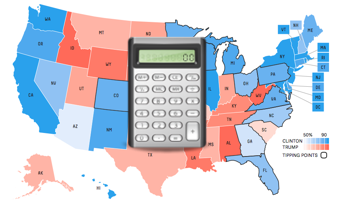
|
US Vote SmartDoes a 3rd Party Waste My Vote? |
 |
Every election we hear talk of how bad the candidates are, but this sentiment is running especially high in 2016 - on both sides of the aisle. So, do we "hold our nose" and vote for "our" bad candidate because the "other person" is worse? Or do we really "throw our vote away" if we vote third party? At what point is voting for a bad candidate the wrong decision? The following calculator assists you in determining which candidate will statistically[1] give you the best chance of seeing your preferred policies realized over time.[2]
Policy Forecast Calculator
On a scale from 0 (awful) to 10 (ideal), rate the following:
| Clinton | A typical Democrat nominee | ||
| Trump | A typical Republican nominee |
Rate to Discount Future Elections: %
(For example, a discount rate of 10% will reduce the weighting given to each subsequent election by 10%; so the weight the 2016 forecast would be 100%, the 2020 forecast would be 90%, the 2024 forecast would be 81%, and so on.)
Results
| Winner in 2016 | Election Year | ||||||||||
|---|---|---|---|---|---|---|---|---|---|---|---|
| 2016 | 2020 | 2024 | 2028 | 2032 | 2036 | 2040 | 2044 | 2048 | 2052 | ||
| Last Term [3] | Clinton | ||||||||||
| Trump | |||||||||||
| Average [3] | Clinton | ||||||||||
| Trump | |||||||||||
How Can These Results be True
Every election affects every subsequent election. In particular, consider some basic historical facts:
- Since 1900, there has been only one time where a party has controlled the presidency for only a single term (Carter, 1976-1980)
- Only once in the nation's history has an elected President (Pierce, 1856) lost his party's nomination, though LBJ decided to not to run after it became clear that he would lose.
- There are only six cases in our nation's history where a sitting President (four of which were only elected as VPs) failed to obtain their party's nomination. With the exception of LBJ, all of these were in the 1800's and with the exception of Pierce, their party's all lost the general election.
- There have been only 4 times in the nation's history when the same party has occupied the Presidency for more than 12 consecutive years
Why is this the case? Many believe that the public recognizes that most policies require more than 4 years to take full affect. When a new party comes into office, the public seems to be more forgiving; but after two terms, the public becomes skeptical while their opponents are able to place full responsibility on the party in control. The result is better than a 90% re-election rate after the first term, and less than 50% re-election rate for subsequent terms.
So, it's almost certain that if your preferred "bad" candidate wins this year, you'll have to face a similar dilemma in the next election as well ("your candidate will be the same, while the opponent will be different). If you think your party's current bad candidate is an anomaly, then there is a possibility that you may see a better long-term result if the other candidate wins in 2016.
Obviously the outcome is highly subjective based on the individuals political views. Thus, the calculator requires the user to evaluate Clinton and Trump, along with generic Republican and Democrat nominees, on a 0-10 point scale (10 preferred). You can also decide how far into the future you want to consider and adjust the weighting given to future elections. As you might expect, the further out you look, the numbers will tend towards the average between the generic Republican and Democrat nominees.
The calculator uses historical trends on the re-election of presidents (and presidents from the same party). Each presidential term is given a score based on your rating of the victorious candidate/party and the probability of that candidate/party holding office that term. The terms are then summed (with any discounted weightings applied) and divided to provide an answer on the same 10-point scale that was initially used to grade candidates./p>
Are You Suggesting that I Vote for the Other Party
No, the calculator simply provides information for you to consider. You may be surprised by the results; but this does not mean that you should vote for the other party, it merely demonstrates that voting for "your party's" bad candidate is not as advantageous as the major parties try to make it sound. Rest assured, if you vote for a candidate named on the ballot, your vote will count. Almost certainly, your vote will not be the one magical vote that decides the election. The more important question to consider is whether you want to give either mainstream candidate more of a mandate, if they win? Or do you want to give your party (and the world) the message that you find "your party's" candidate acceptable? Or would you rather show that you are dissatisfied with all bad candidates by voting for someone else and deliver the message to the winner that they only have the support of perhaps 30-40% of the popular vote? Our calculator is only a tool to provide one data point to consider as you decide how your vote really changes outcomes.
[1] Statistics are based on election patterns since 1900; as always, past performance does not guarantee future results.
[2] Preferred policies are loosely defined based on the overall ratings you assigned to candidates.
[3] Probabilities based on party change patterns in presidential elections from 1900-2012.
